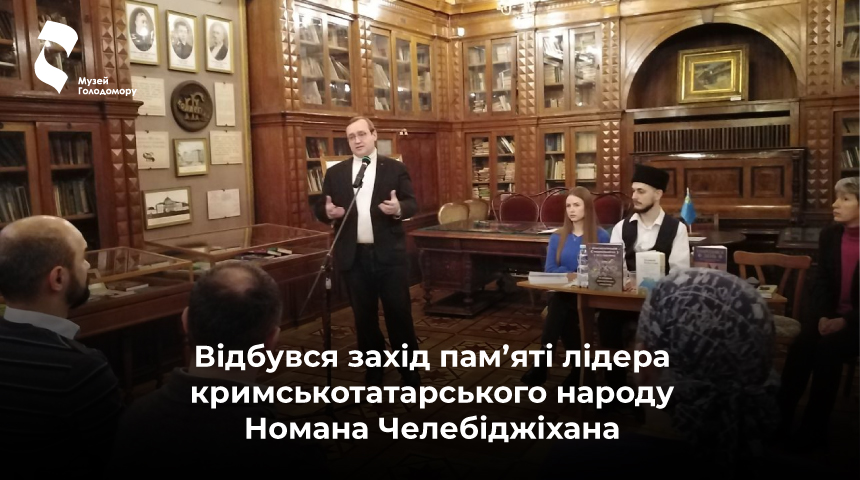An event took place to commemorate Noman Chelebijihan, the leader of the Crimean Tatar people
February 23 is the 105th anniversary of the tragic death of Noman Chelebijihan, the leader of the Crimean Tatar people. Honouring the memory of an outstanding son of the Crimean land, a public dialogue, “Noman Chelebijihan (1885-1918): Crimean Tatar national leader, writer and mufti,” was held at the National Museum of Literature of Ukraine. The event was organized by the museum where it was held, the National Museum of the Holodomor-Genocide and the Institute of Cultural Studies of the National Academy of Sciences of Ukraine.
“He was one of the national leaders of the Crimean Tatars of the first echelon, one of the brightest and most important figures in their entire history. In my opinion, in the 20th century the Crimean Tatar people had three most prominent leaders – Ismail Gasprinskyi, the predecessor of Chelebijihan, Noman Chelebijihan himself, and Mustafa Dzhemilev, – Andrii Ivanets, candidate of historical sciences, leading researcher of the National Museum of the Holodomor-Genocide, said. — Noman Chelebijihan is the youngest among them. Fate gave him the least amount of time – only 32 years, but he did no less than other national leaders.”
Andrii Ivanets, who is the author of monographs on the history of Crimea in 1918-1920 and on the first Kurultai of the Crimean Tatars, as well as the co-author of several books on the past of Crimea and the Crimean Tatar people, spoke about Noman Chelebijihan’s life, his formation as a national leader and historical conditions in which it happened.
The future leader of the Crimean Tatars was born in 1885 in the family of the imam of the mosque of the village of Biyuk-Sunak, which does not exist today. He was educated in several madrasahs, and in 1906 he came to study in Istanbul, where from 1908, he studied law and theology at Istanbul University. There, together with like-minded people, he founded the Society of Crimean Students (Kyrym Talebi Jemieti) and the underground political organization “Vatan” (“Motherland”), the members of which were Crimean Tatar students in the Ottoman Empire. Later, he received a higher legal education in St. Petersburg, and during the First World War, he was mobilized into the army.
The future leader of the Crimean Tatars was born in 1885 in the family of the imam of the mosque of the village of Biyuk-Sunak, which does not exist today. He was educated in several madrasahs, and in 1906 he came to study in Istanbul, where from 1908, he studied law and theology at Istanbul University. There, together with like-minded people, he founded the Society of Crimean Students (Kyrym Talebi Jemieti) and the underground political organization “Vatan” (“Motherland”), the members of which were Crimean Tatar students in the Ottoman Empire. Later, he received a higher legal education in St. Petersburg, and during the First World War, he was mobilized into the army.
After the February Revolution of 1917, Chelebijihan returned to Crimea, where he headed the national movement of the Crimean Tatars. In April 1917, for the first time in the post-imperial space, he was democratically elected Tavria mufti and commissioner of the Tavria Muslim spiritual board, which united Muslims of Crimea, Lithuania, Poland, Belarus and Ukraine. He advocated the creation of an autonomous statehood in Crimea — a “real civilized Switzerland” in which the different ethnic groups of the peninsula would coexist peacefully. He developed and implemented a system of local self-government bodies, and carried out a number of revolutionary, as for the Muslim world, reforms in education and spiritual life, in particular, he advocated equal rights for men and women. He was one of the co-authors of the Crimean Tatar constitution.
In 1917, he became one of the initiators and main organizers of the first Kurultai of the Crimean Tatar people, which began as a national constituent assembly and continued as a national parliament. Later, he became the first head of the Crimean Tatar National Government from 1917-1918.
In addition to social and political activities, he was engaged in journalism and writing. He is the author of the poem “Ant etken!” (“I swore!”), which became the national anthem of the Crimean Tatars.
In January 1918, he was arrested by the Bolsheviks and transported to the city prison of Sevastopol.
“The Bolsheviks, who did not have widespread support in Crimea, were able to mobilize the sailors of the Black Sea Fleet to their side and seized power on the peninsula by force. Even then, they successfully played on the national issue, convincing the locals that “the dictatorship of the Tatars threatens you” (familiar tricks, right?). Inflamed by Bolshevik propaganda, sailors broke into the Sevastopol prison on February 23 and brutally killed Noman Chelibjihan, and his body was thrown into the sea. That’s why we don’t know where his grave is today, – Andrii Ivanets noted. “But we know and appreciate the remarkable legacy that this Crimean Tatar figure left behind.”
Nadiia Honcharenko, senior researcher at the Institute of Cultural Studies of the National Academy of Sciences of Ukraine, and editor of the series “Crimean Tatar Prose in Ukrainian,” told about Noman Chelibjihan’s literary heritage. In particular, she presented the general book “And a day was born: Crimean Tatar prose in Ukrainian”, which included the works of Chelibjihan, read an excerpt from his work and called to get to know this writer’s work more closely. In the end, Alina Bondarenko and Arslan Fazilov read excerpts from Noman Chelibjihan’s story “Prayer of Swallows” in Crimean Tatar and Ukrainian languages. This is a moving work, written in 1913, about how the Crimean Tatar language was destroyed in the Russian Empire. More than a century has passed, and in the modern “Russian Empire,” it continues to this day…
